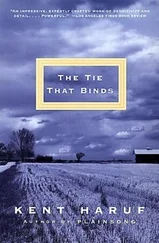She was an old woman in a thin flowered housedress with a long apron covering it. She was humpbacked and required a hearing aid, and her hair was yellow and pulled back into a knot, and her bare arms were spotted and freckled and the skin hung in folds above the elbows. On the back of one of her hands was a jagged purple bruise like a birthmark. When she was seated she took up a cigarette that was already lit and sucked on it and expelled smoke toward the ceiling in a gray stream. She was watching the two boys from behind her glasses. Her mouth was vivid red.
Well, she said. I’m waiting.
They looked at her.
Start talking, she said.
It’s two dollars and fifty cents, Mrs. Stearns, Ike said. For the paper.
That’s not talk. That’s only business. What’s the matter with you? What’s the weather like?
They turned and looked through the gauzy curtain draped over the window behind them; the curtain smelled heavy of dust. The view was of the back alley. It’s sunny, Bobby said.
The wind isn’t blowing today, Ike said.
But the leaves are falling.
That’s not weather, Ike said.
Bobby turned his head to look at his brother. It has something to do with it.
It isn’t it, though.
Never mind, Mrs. Stearns said. She stetched a wrinkled arm along the wide armrest of the chair and tapped her cigarette. What are you doing at school? You go to school, don’t you?
Yes.
Well.
They were silent.
You, she said. The oldest one. What’s your name?
Ike.
What grade are you in?
Fifth.
Who’s your teacher in school?
Miss Keene.
A big tall woman? With a long jaw?
I guess so, Ike said.
Is she a good teacher?
She lets us do seatwork at our own speed. She lets us do work at the board and do writing. Then she copies it and sends it to the other grades in school to look at.
So she is a good teacher, Mrs. Stearns said.
But she told a girl to shut up one time.
Did she? What for?
She didn’t want to sit next to somebody.
Who didn’t she want to sit next to?
Richard Peterson. She didn’t like the way he was smelling.
Well, yes, Mrs. Stearns said. His people have a dairy. Don’t they.
He smells like their cow parlor.
So would you if you lived on a dairy and you had to work on it, Mrs. Stearns said.
We have horses, Ike said.
Iva Stearns studied him for a moment. She appeared to be considering this remark. Then she drew on her cigarette and put it out. She turned to Bobby. What about you? she said. Who’s your teacher?
Miss Carpenter, Bobby said.
Who?
Miss Carpenter.
I don’t know her.
She’s got long hair and. .
And what? Mrs. Stearns said.
She always wears sweaters.
Does she.
Mostly, he said.
What do you know about sweaters?
I don’t know, Bobby said. I like them, I guess.
Huh, she said. You’re too young to be thinking about women in sweaters. She seemed to laugh a little. It was a strange sound, awkward and tentative, as if she didn’t know how. Then suddenly she began to cough. She knew how to do that. Her head was thrown back and her face darkened while her sunken chest shook beneath the apron and housedress. The boys watched her out of the corners of their eyes, fascinated and afraid. She wrapped her hand over her mouth and shut her eyes and coughed. Thin tears squeezed out of her eyes. But at last she stopped, and then she took her glasses off and removed a clot of Kleenex from the pocket of her apron and dabbed her eyes and blew her nose. She put her glasses on once more and looked at the two brothers sitting on the sofa watching her. Don’t you boys ever smoke, she said. Her voice was a rasping whisper now.
But you do, Bobby said.
What?
You smoke.
Why do you think I’m telling you? You want to end up like me? An old woman left all by herself staying in rooms that don’t even belong to her. Living upstairs over a dirty back alley?
No.
Then don’t, she said.
The boys looked at her and then around the room. But don’t you have any family, Mrs. Stearns? Ike said. Somebody for you to live with?
No, she said. Not anymore.
What happened to them?
Speak up. I can’t hear you.
What happened to your family? Ike said.
They’re all gone, she said. Or they’re all dead.
They stared at her, waiting for what else she would say. They could not think what she should do, how she might correct the way her life had turned out. But she said no more about it. Instead, she appeared to be looking past them toward the curtained window overlooking the alley. Behind her glasses her eyes were the pale blue of the finest paper and the whites too appeared bluish, with the finest squills of red. It was very quiet in the room. The vivid lipstick was smeared onto her chin from when she had covered her mouth, trying to stifle her cough. They watched her and waited. But she didn’t speak.
At last Bobby said, Our mother moved out of the house.
The old woman’s eyes turned slowly back now from where they’d been looking. What did you say?
She moved out a few weeks ago, Bobby said. He was speaking softly. She doesn’t live with us anymore.
Doesn’t she?
No.
Where does she live?
Shut up, Bobby, Ike said. That’s nobody’s business.
It’s all right, Mrs. Stearns said. I’m not going to tell anyone. Who would I tell anyway?
She studied Bobby and then his brother for a long while. They sat on the davenport waiting for her to speak again.
I’m very sorry, she said finally. I’m very sorry to hear about your mother. Here I was, talking about myself. You must be lonely.
They didn’t know how to say anything about that.
Well then, she said. You come and see me if you want to. Will you?
They watched her doubtfully, sitting on the sofa, the room silent and the air about them smelling of dust and her cigarette smoke.
Will you? she said again.
At last they nodded.
Very well, she said. Hand me my pocketbook so I can pay you. In there in the other room on the table. One of you can get it and bring it to me. Will you do that for me, please? I won’t torment you any longer. Afterward you can go on if you want to.
She was certain of it. In herself, she was.
But Maggie Jones said, It happens. For all kinds of reasons, for reasons you can’t anticipate or expect or know about. It could be something else. You just don’t know always what’s going on. You want to be sure.
Even though she felt in herself that she was sure because for one thing she had never missed before. Until the last months she’d always been as predictable as clockwork, and because for some time she’d been feeling different, not just the way she felt in the morning when she was still at home and could feel it rising even before she was all the way awake, or when her mother came in and made it worse smoking, standing over her in the bathroom watching her, but other times too when she had a private feeling that she didn’t know how to talk about or to explain to anyone. And there were still other things, when she was feeling tired and about to cry, having to cry for no good reason. Or her breasts feeling too tender, she’d noticed that sometimes at night when she got into bed, and look at her nipples, how they were now, all swollen dark.
But Maggie Jones said, Still you want to be sure.
And so she, Maggie Jones, had brought the kit home from the store one evening. They were out in the kitchen. Maggie Jones said, At least try it. Then we’ll know for sure.
You think I should?
Yes, I think you should.
How do I? she said.
It says here, you hold the absorbent tip in the urine stream. Hold it under you while you go. Then you wait for five minutes and if both lines turn red in the viewing window, then you are. Here. Take it.
Читать дальше







